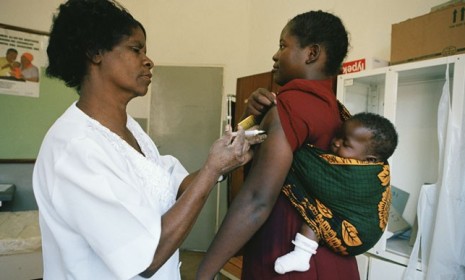An 'alarming quandary': The birth control that doubles HIV risk
A new study warns that women taking a popular injectible contraceptive may be twice as likely to contract or transmit HIV

A free daily email with the biggest news stories of the day – and the best features from TheWeek.com
You are now subscribed
Your newsletter sign-up was successful
A popular contraceptive may double the risk of HIV infection in women, according to a new study published in The Lancet. The contraceptive shot, administered every three months, is used by 12 million women in Eastern and Southern Africa — one of the most common forms of birth control in the region. More than 1 million American women use the contraceptive, too. (One brand name in the U.S. is Pfizer Inc.'s Depo Provera.) Here's what you should know:
How was this study conducted?
University of Washington researchers spent two years following 3,790 heterosexual African couples in which one person had tested positive for HIV and the other had not. Researchers tracked which couples used which contraceptive methods — and found that women using these particular injections were twice as likely to be HIV-positive as other women. Plus, HIV-positive women using this form of birth control were twice as likely to transmit the virus to their male partners than other women were.
The Week
Escape your echo chamber. Get the facts behind the news, plus analysis from multiple perspectives.

Sign up for The Week's Free Newsletters
From our morning news briefing to a weekly Good News Newsletter, get the best of The Week delivered directly to your inbox.
From our morning news briefing to a weekly Good News Newsletter, get the best of The Week delivered directly to your inbox.
Why does the injection increase the risk of HIV?
More research needs to be conducted, but it's possible that biological changes brought about by the injected hormones change the cells lining a woman's vagina or cervix, which defend against sexually-transmitted diseases
How necessary is this form of birth control?
The health-care infrastructure in Africa is often poor, and effective contraceptives are critical since "hundreds of thousands" of women "suffer injuries, bleeding, infections, and even death in childbirth from unintended pregnancies." And this particular birth control method has been quite popular since it lasts for several months with minimal fuss and upkeep. But now, these results present an "alarming quandary" for African women, says Pam Belluck of The New York Times.
A free daily email with the biggest news stories of the day – and the best features from TheWeek.com
What now?
Pfizer, maker of one of the injections, hasn't commented yet. The World Health Organization will meet in January to evaluate this new evidence and decide whether to change its guidelines, warning women that this form of birth control might increase their risk of contracting or spreading HIV.
Sources: Bloomberg BusinessWeek, MSNBC, New York Times
-
 The Olympic timekeepers keeping the Games on track
The Olympic timekeepers keeping the Games on trackUnder the Radar Swiss watchmaking giant Omega has been at the finish line of every Olympic Games for nearly 100 years
-
 Will increasing tensions with Iran boil over into war?
Will increasing tensions with Iran boil over into war?Today’s Big Question President Donald Trump has recently been threatening the country
-
 Corruption: The spy sheikh and the president
Corruption: The spy sheikh and the presidentFeature Trump is at the center of another scandal